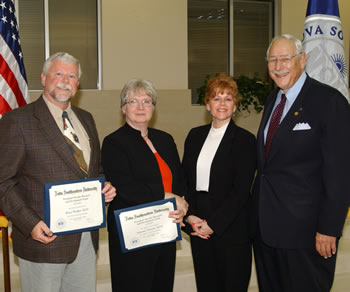A Correlational Study on the Bibliometric/Citation Analysis Variables Affecting the Quality of Resources Used in Ed.D. Applied Dissertation Reference Lists at NSU and Selected Ed.D. Programs at First-Tier Carnegie Research Institutions in the United States
Grant Winners
- Johanna Tuñón, Ed.D. – Alvin Sherman Library
- Bruce Brydges, Ed.D.
Deans
- Vice President Donald Riggs - Alvin Sherman Library
- H. Wells Singleton
Abstract

The researchers' previous research (Brydges & Tunon, 2005; Tunon & Brydges, 2004) demonstrated that citation analysis in conjunction with objective and subjective rubrics can be used to unobtrusively and reliably assess the overall quality of dissertation reference lists. This study builds on these findings to compare NSU's dissertation reference lists with those from peer institutions and identify factors that may be accounting the significant differences in patterns of usage. Bibliometric data gathered from citation analysis from the previous study as well as newly completed dissertations will be used to identify and correlate cited resources with subject indices and the availability of resources in NSU's online subscription databases. Two assessment tools validated in the researchers' 2004-2005 grant will be used to identify the types and quality of resources used in dissertations from EdD programs at 9 Carnegie I research institutions in the United States. Multiple regression analysis will establish predictor variables utilized by students in the production of quality dissertation reference lists. As well, the study will compare the efficacy of new intensive faculty - librarian team taught library training methodology used with a recent cohort of 54 students to that of a previous cohort of 144 students. The data from 250 FSEHS dissertations will also be used to compare the types of resources of dissertation reference lists produced by FSEHS students on campus to field-based versus online clusters. The results of this study will inform the graduate literature research process by providing committee members with a better understanding of the resources being used and how FSEHS students compare with a random sample of 50 education graduates from 9 Carnegie research institutions. Dissemination of this research will also contribute to the larger dialog in the academic community about the impact of distance education and online resources on the quality of graduate dissertations.